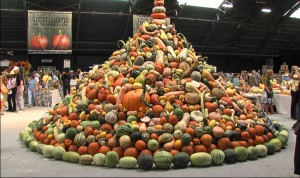
One of the recent events that Southern Exposure attended is the National Heirloom Expo in Santa Rosa, CA. This is quite the trek for us, but it’s rare to be able to connect with a group of individuals and organizations that are as passionate about preserving genetic and heritage diversity as we are, striving to instill a deep appreciation of traditional, regionally adapted food sources.
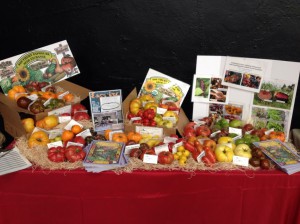
Although we specialize in heirloom seed adapted to the Southeast and Mid-Atlantic regions, when I set up our exhibit of heirloom tomatoes, I was pleased to see how well our many of our varieties do in this climate. A big thanks to local tomato extraordinaire Tamara for generously providing us with tomatoes – with her help, we won 2nd place in the exhibit!

In our booth, I enjoyed talking with passersby about the value of saving your own seeds, including the ability to select the most desirable traits for your area. Many food advocates are beginning to understand the allure of seed saving: slowly, over time, tailoring a variety to have a unique profile of characteristics, including taste, appearance, resistances to disease, ease of harvesting and preserving, and the less quantifiable satisfaction of building regionally food heritage.
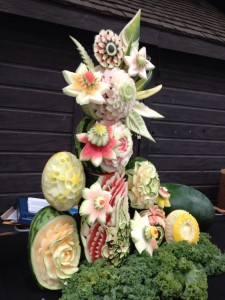
We also staffed a booth for a long-time ally the Organic Seed Growers And Trade Association (OSGATA), helping to raise awareness about the importance of preserving organically sourced seed and the create a resilient and decentralized food system.
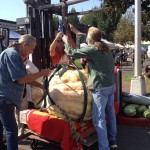
As someone who has been intermittently involved in food activism for a number of years, I offered to do a presentation highlighting community models that are building the food justice movement. The organizations that I featured focus on one or more of the following: promoting and supporting young and beginning farmers, building a local economy, using ecologically conscious gardening techniques, helping empower marginalized populations, and working to alleviate food deserts, which includes components of education, affordability, and proximity to healthy fresh food. Special thanks to Renew Richmond, Allegheny Mountain School (AMS), and the Anti-oppression Resource and Training Alliance (AORTA) for taking time out of their day to do an interview with me, along with the Greenhorns and the Agrarian Trust for all the inspiring work they do to bring strength and cohesion to the young farmer movement.
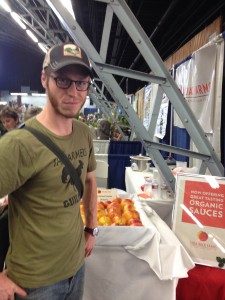
After my talk, I was pleased to meet many speakers and attendees who contribute to the work of food justice. I met Evan Wiig, who helped found the Farmer’s Guild, which is a network for young a beginning farmers who meet on a monthly basis to share knowledge and resources. Only several years in existence, the Farmer’s Guild is already in 7 locations throughout Northern California. I decided to hear Evan talk about the Farmer’s Guild, and was quite impressed – passionate and motivated leaders such as Evan are what we need to send the young farmers forward into the future as a thriving movement. Cross your fingers for him doing a presentation at next year’s Heritage Harvest Festival!
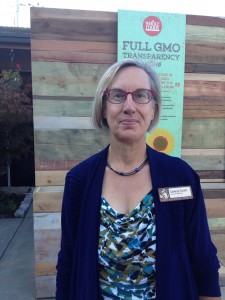
Next, I met Cathryn Couch with the Ceres Community Project, which serves hot, organic meals to individuals and families who are dealing with serious illness, prepared by youth in the community. The way Kathryn sees it, all youth are “at-risk” youth if they don’t find a sense of belonging. Clients are often so appreciative of these meals, that they come and thank the youth who prepared them personally, and consequentially, some of the youth have participated in the project for four years now. This is an example of how food can intersect so many areas – health, the environment, youth empowerment, and a social safety net maintained by community members, for community members, just to name a few.
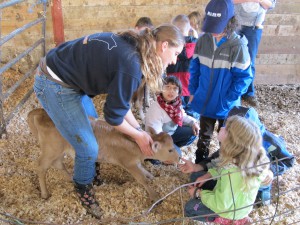
Happily surrounded by heirloom enthusiasts, I met the expo coordinator, Paul Wallace, who told me about how this year they’re having the Education & Fun Day seriesfor kindergarten through high school aged kids. There, they’ll have activities including “be a farmer for a day,” name that veggie, potato sack races, probiotic mud balls, seed ball making, seed saving, and worm bin exploration. He’s expecting over 2,000 kids from surrounding schools to attend. Although school gardens are gaining traction throughout the nation, the effects of more garden based curriculum such as this could be tremendous, with more and more people of generations to come interested in and connected to their food source.
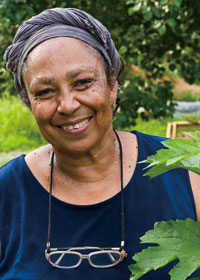
Last but not least, I met Arno Hesse and Samantha Dweck with Credibles, an umbrella project of the Slow Money movement where consumers can pre-pay for their years’ worth of groceries from their favorite food provider, helping local food-related businesses access capital for growth. This program as an intersection of slow food and slow money, where the vital backbones of a more just society – food and the economy – grow in tandem. Southern Exposure Seed Exchange will be attending upcoming Slow Money Conference in Louisville. Join us there to hear seed saver extraordinaire and co-manager of Southern Exposure Ira Wallace talk about seeds and diversity.
